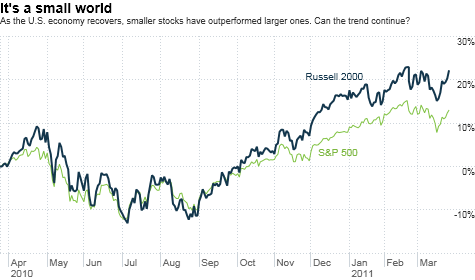Small stocks
Post on: 27 Июль, 2015 No Comment

The long term performance of small capitalisation stocks vs large capitalisation stocks is one of the most debated topics in finance. For decades there has been talk of a small capitalisation effect.
The small capitalisation effect is believed to be a significantly higher return from small stocks compared to large stocks. It is now accepted conventional wisdom that the greatest gains are to be made in small capitalisation stocks, but there are those that disagree.
James O’Shaughnessey argues after studying the data in What Works on Wall Street that the apparent higher returns of small cap stocks come entirely from micro-capitalisation stocks that trade in such low volumes that it is virtually impossible to buy them in any quantity without disturbing their markets and pushing up the price.
David Dreman, author of Contrarian Investment Strategies: The Next Generation argues that the evidence is only minimal for any improvement in the returns of small stocks, but liquidity is so bad that you give away a lot in trading expenses. He also points out that a very large proportion of the supposed outperformance comes from only a few short bursts of growth over the last century, and that most of the time they go nowhere.
A middle ground seems to exist where people claim that small capitalisation stocks have on average performed a bit better than large stocks, even after taking into account expenses. Various products have popped up to mimic small capitalisation stock indexes, most notably products by Dimensional Fund Advisors, one of the world’s largest index managers, created by some of the biggest Nobel Prize winning academics in finance.
Well so much for indexes, there are many that argue that the best results are to be found not in buying small cap index funds but in buying actively managed funds.
One thing that nobody debates is the idea that small companies are less widely followed by the professional investment community and hence less efficiently priced. There are dozens of highly trained analysts watching every move of every large company, but often none at all watching companies outside of the top couple of hundred stocks.
If you are a good analyst, it is tempting to think you will excel by focusing on small cap stocks. Warren Buffett himself, when asked how he would invest if he had to start off again from scratch tomorrow with only small seed capital claimed that he, and a few others he knows, could make 100%pa by focusing on small cap stocks and aggressive merger arbitrage strategies. I’ve never known Buffett to make a boast he couldn’t keep, so it is interesting to think of the possibilities.

A Merryl Lynch seminar I attended early in 2002 had some interesting charts on small cap stocks. Returns in stocks in the small cap market are distributed very differently to the way large cap stocks move. More so than for large stocks, small cap stocks tend to have a small number of really big winners and the rest do very poorly. Merryl Lynch was arguing that this provides an opportunity for a really good analyst to profit tremendously from security analysis. They also pointed out that small cap stocks are one of the few sectors in Australia where actively managed funds regularly beat their benchmark indexes by a large margin. (ie the small ordinaries index has on average had very poor performance in the last ten years, but there are plenty of small cap funds with 20%+pa performance. I wonder personally if there might not be some survivorship bias in this figure though.)
I’m always sceptical of anything a commercial fund manager has to say, especially when as in this case they are just trying to sell something (this seminar was the launch of a new Global Small Caps fund), though it was still food for thought.
Jim Slater, author of The Zulu Principle . and its sequel writes of the great advantages that amateurs have in small cap stocks over the professionals. We don’t have much money to invest, which is good, because it means we can take relatively large positions in a few stocks and watch them carefully. Major fund managers have massive liquidity restrictions, they simply have too much money to bother dabbling in small cap stocks.
So if one goes along with the thesis that active management can work well, it would appear that amateurs would be working at a great advantage to professionals in this regard. I’m not recommending you focus on small cap stocks, or avoid them, but there is some evidence that a small cap value indexing strategy (DFA has funds like this) or a very selective active investment program could work well, provided you keep away from the speculative growth end of the small cap market, where you are more likely to lose everything than enjoy a high return.














